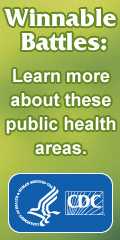October 2015
Did You Know? is a weekly feature from the Office for State, Tribal, Local and Territorial Support to inform your prevention activities. We invite you to read, share, and take action!
View the Current Did You Know?
October 30, 2015
- Only 1 in 2 adults and 1 in 4 high school students in the United States meet the guidelines for aerobic physical activity.
- Physical activity, such as brisk walking, can help lower risk for heart disease, stroke, type 2 diabetes, depression, and some cancers.
- The US Surgeon General is calling on the nation to better support walking and walkable communities [PDF-2.6MB] where people live, work, and play.
October 23, 2015
- Nearly 20 million new sexually transmitted infections [PDF-1.6MB] occur each year in the US, accounting for almost $16 billion in healthcare costs.
- CDC’s updated Sexually Transmitted Diseases Treatment Guidelines—which include a new alternate treatment option for gonorrhea—are now available to help healthcare providers diagnose and treat STDs.
- Providers can find CDC resources such as pocket guides [PDF-319KB], wall charts [PDF-218KB], and an app to help them use the updated treatment guidelines.
October 16, 2015
- Blood clots affect as many as 900,000 Americans each year, and about 50% of them are related to a recent hospital stay or surgery.
- Most healthcare-associated blood clots happen after patients leave the hospital—learn the signs and symptoms and when to seek medical care.
- You can test your knowledge about healthcare-associated blood clots and help prevent them by sharing new CDC infographics, fact sheets, and e-cards.
October 9, 2015
- Hospital practices in the first hours and days after birth can influence how babies are fed, according to the latest CDC Vital Signs.
- In 2013, 54% of hospitals were using a majority of the Ten Steps to Successful Breastfeeding—up from only 29% in 2007.
- Hospitals can further improve their practices to support breastfeeding by taking recommended steps to become Baby-Friendly.
October 2, 2015
- Washing your hands should involve these 5 scientifically proven steps.
- Handwashing can reduce the number of people who get diarrhea by about 30%.
- Spread the word about how to stop the spread of germs on Global Handwashing Day and every day.
Did You Know? information and web links are current as of their publication date. They may become outdated over time.
- Page last reviewed: November 9, 2015
- Page last updated: October 14, 2016
- Content source:



 ShareCompartir
ShareCompartir



